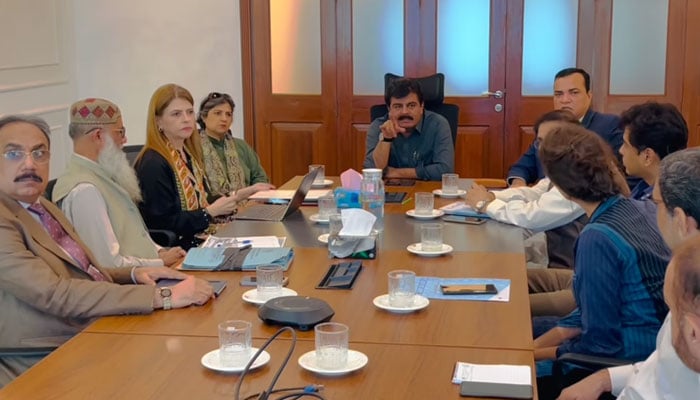Sindh govt to review early childhood education policy, integrate foundation learning mechanism
The Sindh government has decided to review its early childhood education (ECE) policy and incorporate the foundation learning mechanism into its framework, a statement said on Wednesday.
A meeting chaired by Sindh Minister for Education and Mineral Development Syed Sardar Ali Shah focused on enhancing the ECE programme and including Foundation Learning and Numeracy in the policy draft.
Participants included School Education Secretary Zahid Ali Abbasi, Chief Program Manager RSU Dr Junaid Samo, Zindagi Trust’s Shehzad Roy, CEO Durbeen Salma, Chief Curriculum Advisor Dr Fauzia, STEDA Executive Director Syed Rasool Bux Shah, Development Consultant Prem Sagar, and education researcher Dr Fatima Dar.
The meeting highlighted that the ECE policy was implemented in Sindh in 2015. Currently, 6,000 ECE classes are operational, educating over 800,000 children aged 3 to 8. Teachers have been recruited and trained, with learning materials and workbooks in English, Urdu, and Sindhi already developed to support the programme.
Shah emphasized the need to strengthen activity-based learning and incorporate the foundation learning and numeracy mechanism into the policy. He underlined the importance of nurturing children’s physical, mental, emotional, and social development during the transition from early education to primary classes.
The minister also stressed focusing on psychological development and modern learning methods, such as picture books, educational games, and creative tools, to achieve ECE goals. He noted that the foundation learning mechanism would enhance teacher-parent coordination, aid in addressing psychological challenges, and build foundational literacy and numeracy skills essential for future learning.
Additionally, Shah directed private schools to hire trained ECE teachers and urged universities to develop ECE programmes and diploma courses. Salma, CEO of Durbeen, suggested prioritizing early education in the mother tongue, allowing children to build connections and learn effectively before transitioning to other languages.
The minister welcomed the recommendations, reiterating Sindh’s commitment to providing ECE materials in three languages and further improving the curriculum to enhance learning outcomes.
-
 Alexandra Daddario, Andrew Form Part Ways After 3 Years Of Marriage
Alexandra Daddario, Andrew Form Part Ways After 3 Years Of Marriage -
 Eric Dane Rejected Sex Symbol Label
Eric Dane Rejected Sex Symbol Label -
 Avan Jogia Says Life With Fiancee Halsey Feels Like 'coming Home'
Avan Jogia Says Life With Fiancee Halsey Feels Like 'coming Home' -
 Kate Middleton's Role In Handling Prince William And Harry Feud Revealed
Kate Middleton's Role In Handling Prince William And Harry Feud Revealed -
 Tucker Carlson Says Passport Seized, Staff Member Questioned At Israel Airport
Tucker Carlson Says Passport Seized, Staff Member Questioned At Israel Airport -
 Taylor Swift Made Sure Jodie Turner-Smith's Little Girl Had A Special Day On 'Opalite' Music Video Set
Taylor Swift Made Sure Jodie Turner-Smith's Little Girl Had A Special Day On 'Opalite' Music Video Set -
 Eric Dane Says Touching Goodbye To Daughters Billie And Georgia In New Netflix Documentary
Eric Dane Says Touching Goodbye To Daughters Billie And Georgia In New Netflix Documentary -
 Channing Tatum Reveals What He Told Daughter After Violent Incident At School
Channing Tatum Reveals What He Told Daughter After Violent Incident At School -
 King Charles Lands In The Line Of Fire Because Of Andrew Mountbatten-Windsor
King Charles Lands In The Line Of Fire Because Of Andrew Mountbatten-Windsor -
 Denise Richards Doubles Down On Abuse Claims Against Ex Husband Aaron Phypers Amid Show Return
Denise Richards Doubles Down On Abuse Claims Against Ex Husband Aaron Phypers Amid Show Return -
 Russia Set To Block Overseas Crypto Exchanges In Sweeping Crackdown
Russia Set To Block Overseas Crypto Exchanges In Sweeping Crackdown -
 Gwyneth Paltrow Reveals Deep Personal Connection With Kate Hudson
Gwyneth Paltrow Reveals Deep Personal Connection With Kate Hudson -
 Prince Harry, Meghan Markle’s Game Plan For Beatrice, Eugenie: ‘Extra Popcorn For This Disaster’
Prince Harry, Meghan Markle’s Game Plan For Beatrice, Eugenie: ‘Extra Popcorn For This Disaster’ -
 OpenAI To Rollout AI Powered Smart Speakers By 2027
OpenAI To Rollout AI Powered Smart Speakers By 2027 -
 Is Dakota Johnsons Dating Younger Pop Star After Breakup With Coldplay Frontman Chris Martin?
Is Dakota Johnsons Dating Younger Pop Star After Breakup With Coldplay Frontman Chris Martin? -
 Hilary Duff Tears Up Talking About Estranged Sister Haylie Duff
Hilary Duff Tears Up Talking About Estranged Sister Haylie Duff




